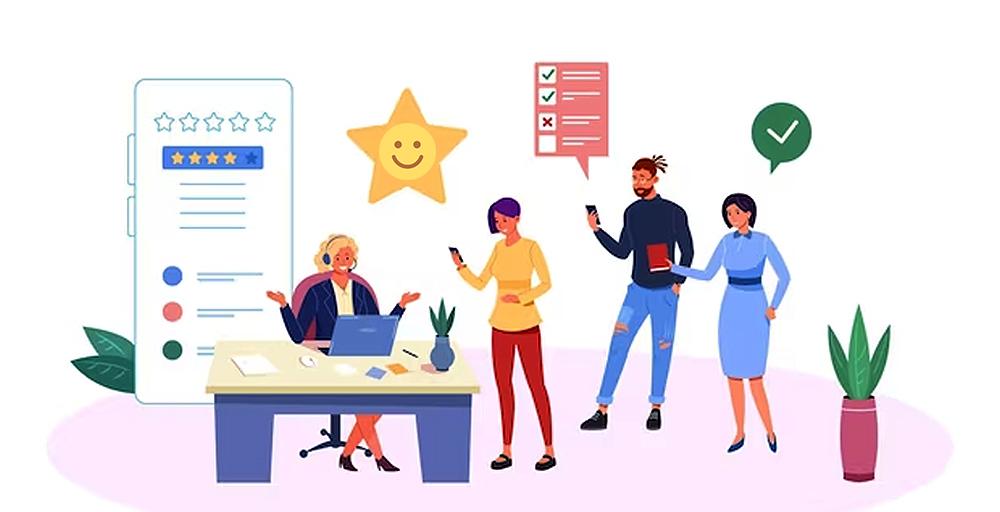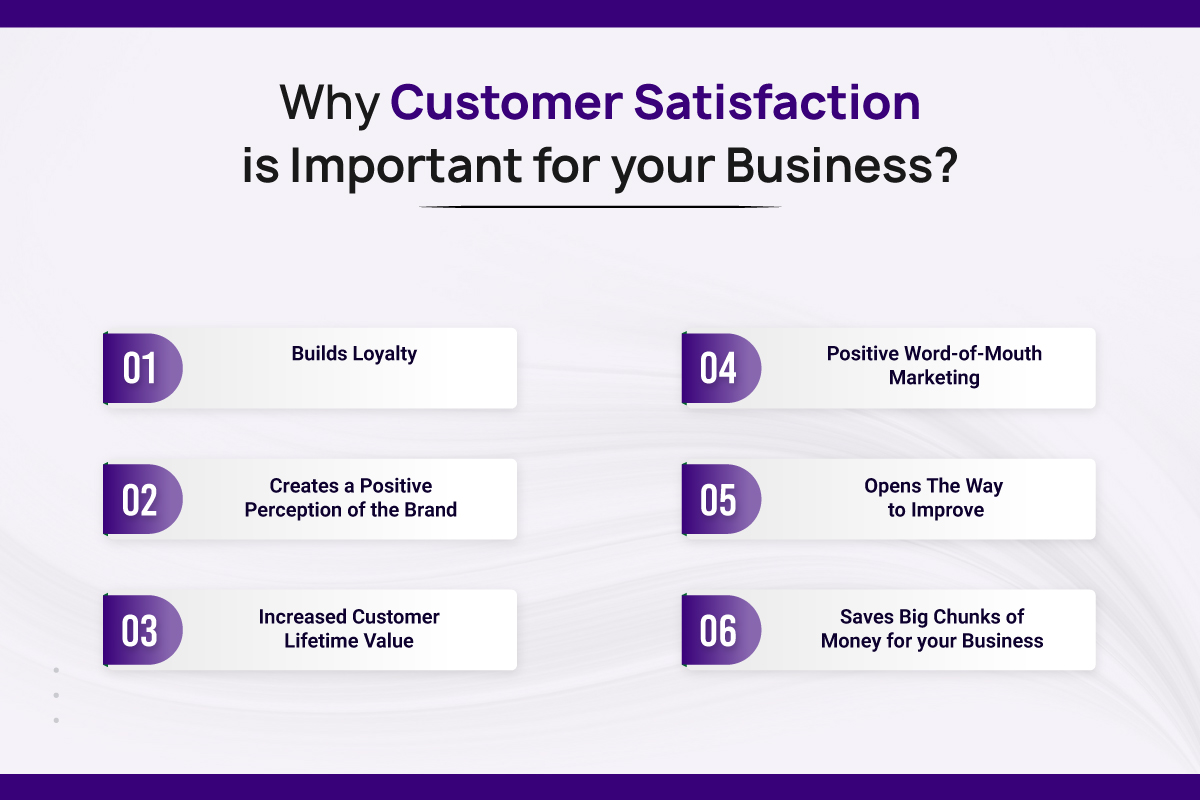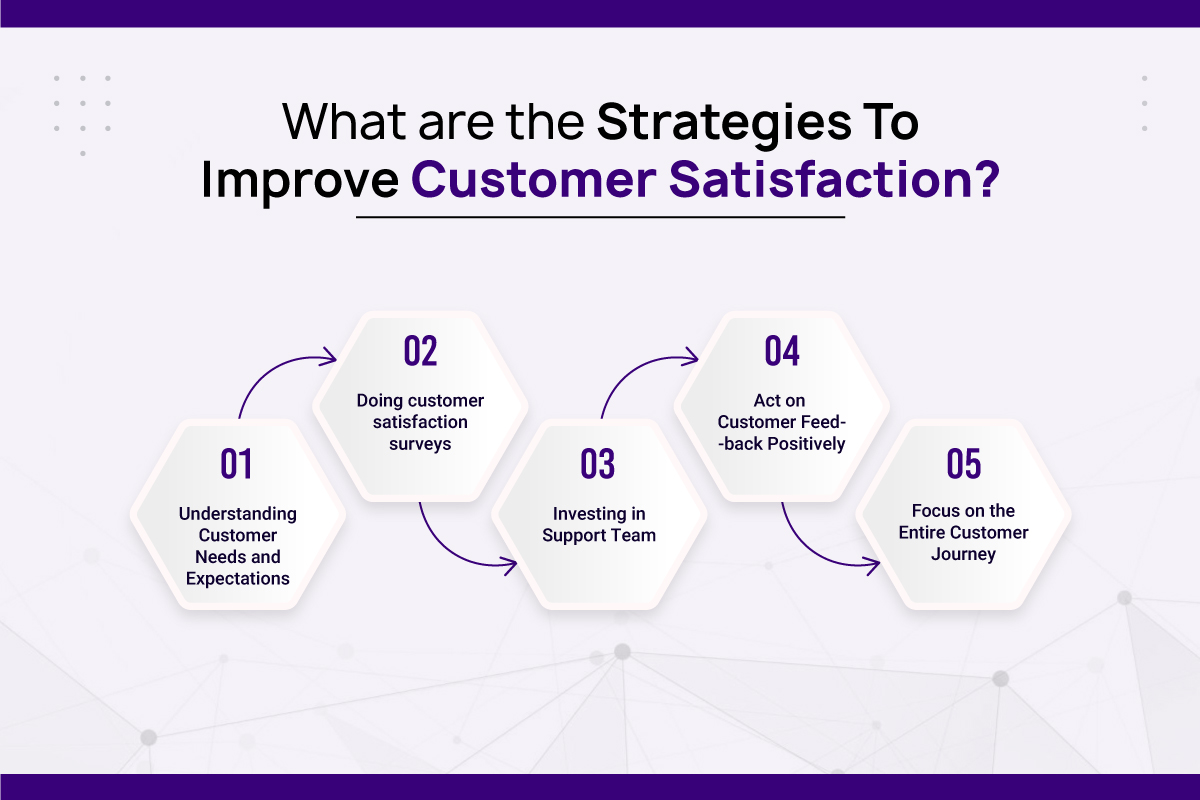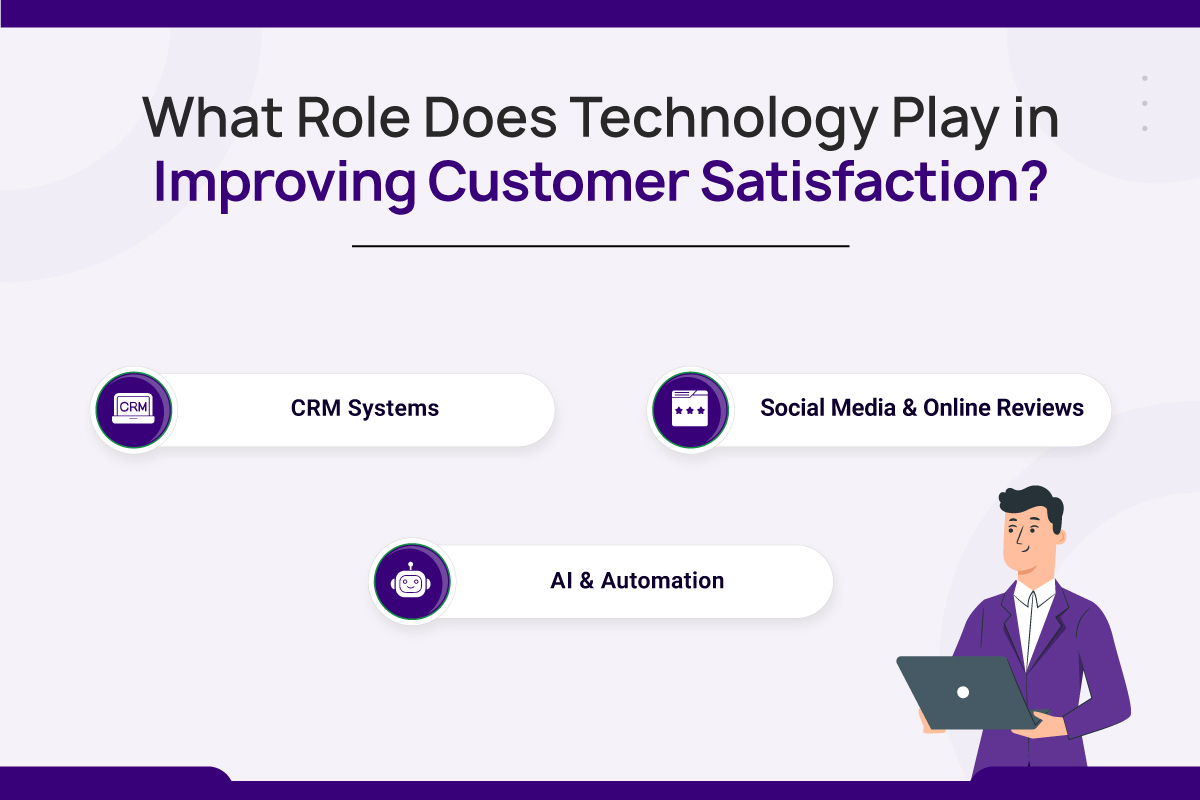Are you putting enough effort into customer satisfaction? Are your customers satisfied with your products and services? 🤔
Customer satisfaction decides your business sales and reputation. Markets are increasingly competitive, and understanding why customer satisfaction should be a top priority for your business is your path to consistent success.
So, what should you do to maintain positive customer satisfaction?
There’s no need to worry about it anymore.
In this article, We’ll cover in detail what customer satisfaction is and its importance, strategies to improve customer satisfaction, and how technology helps to improve customer satisfaction.
What is Customer Satisfaction?

Customer satisfaction means how a business’s products and services meet customer expectations and needs.
Customer satisfaction is not only about measuring business transactions but also about how happy or satisfied a customer is with the products or services or overall business experience.
Why is Customer Satisfaction Important for Your Business?

Keeping your existing and new customers happy and satisfied should be the top priority in your business. Understanding customer satisfaction can help your business shape and develop strategies to serve the customers well.
Let’s understand in detail why customer satisfaction is essential for your business:
1. Builds loyalty
Positive customer satisfaction means you have loyal customers in your business. If a customer is satisfied with your products or services, it leads to repeat business. A loyal customer also helps your business generate new leads with positive word of mouth.
2. Creates a positive perception of the brand
Positive experiences or involvement in your business products and services lead to positive customer satisfaction, productive word of mouth, and spreading brand presence and reputation.
3. Increased Customer Lifetime Value
Customer Lifetime Value(CLV) measures how much an average customer is worth during a lifetime relationship with a business. For instance, If customers are loyal to a brand, they will do more business with it in the coming days. Businesses should focus on customer satisfaction to gain loyal customers and generate more revenue.
🤔 A basic formula or metric used to calculate CLV is:
Customer Lifetime Value = Customer Value * Average Customer Lifespan.
4. Positive Word-of-Mouth Marketing
Word-of-mouth marketing occurs when a customer is satisfied with the business and shares a positive experience or response with other groups, friends, or family.
Loyal customers are brand ambassadors for your business, promoting more with positive word of mouth. Positive word of mouth is a profitable way to increase targeted traffic for you as it reduces marketing costs for your business.
5. Opens the way to Improve.
Where did you miss? The space between customers and your business helps you find a way to improve customer satisfaction.
If your product or services aren’t reaching enough customers, find out what you’re missing and align your product with the customer’s desire.
Start doing customer surveys, reviews, and feedback. Negative feedback and reviews might be harsh to hear, but it will open the way for improvement.
6. Saves big chunks of money for your Business
Spending loads of money on marketing and customer satisfaction strategy? You may not need to spend big chunks of money from now on.
Magnificent customer satisfaction reduces the money spent on marketing and customer satisfaction strategy as the customer acquisition cost decreases and increases the customer lifetime value.
Also, it favors your business from customer loyalty and positive word-of-mouth marketing.
What are the Strategies To Improve Customer Satisfaction?

Maintaining positive customer satisfaction is a challenging task and the lifeblood of any business. It requires proper strategy and planning to maintain positive customer satisfaction.
Let’s go through some effective customer satisfaction strategies and some key areas to focus on:
1. Understanding Customer Needs and Expectations
Customer needs are the motivation that causes a customer to buy a product or service. At the same time, customer expectations are what a customer perceives about a product, service, or brand.
Customers all over the world have different perceptions with different needs and expectations. You can conduct customer research surveys and study their behavior and preferences to understand their needs and expectations.
Let’s understand it more deeply with an example: If your targeted customers are from the USA and are complaining about your products and services, you can get a USA virtual phone number to interact with customers and solve their pain points quickly, anytime, and anywhere.
2. Doing customer satisfaction surveys
Customer satisfaction surveys give you insights into what’s working across your business and what isn’t.
You must create an open door for your customers and let them share their pains or queries with your business products and services. Along with that, it will give ideas for improvement for your business.
3. Investing in Support Team
Investing in a support team ensures the tackling of tricky situations and provides excellent customer support.
Make sure to train your customer support team well. Provide required resources to the support team. Awareness of customer satisfaction makes them physically and mentally ready for the upcoming challenges.
Talking about the customer’s side ensures they have someone to listen to and solve their queries, which helps build a strong relationship between the businesses and the consumers.
4. Act on Customer Feedback positively
Respond to customer queries positively and professionally. Don’t interrupt when they are expressing their queries; respond when they’re finished speaking.
Make an apology on behalf of the company if something is wrong with the product or services. Make them feel you understand their problems and solve them ASAP.
Listening to customer’s feedback will lead you to make necessary improvements and get to know customer’s expectations of your product.
5. Focus on the entire customer journey
The customer journey is a chain of steps that starts with brand awareness before a person becomes a customer, leading to purchase, customer satisfaction, and even customer loyalty.
Focus on the customer journey, brand awareness, purchase, how they engage with your product, satisfaction level, expectations, and retention.
Also, focus on the customer journey map, like the consideration stage, intent, and pain points. Make necessary improvements using customer journey data.
What role does technology play in improving customer satisfaction?

In today’s fast-paced, competitive business environment, customer satisfaction is more important than ever. Businesses are adapting technology as a powerful tool to meet customer’s expectations and provide a seamless customer experience.
From effective customer relationship management (CRM) systems to social media strategies and Artificial Intelligence softwares, we’ll cover everything about the role of technology in improving customer satisfaction:
1. Customer Relationship Management (CRM) Systems
Customer Relationship Management (CRM) systems are designed to streamline interactions and manage business relationships with customers or future customers. The goal is set: Improve your relationship with customers to grow your business.
From customer details to purchases to communication history, CRM systems provide you with all the customers’ insights. A CRM system can be used for sales, marketing, business development, customer service, or any business.
CRMs are a great way to manage internal and external interactions and relationships. By allocating customer data from CRMs, businesses can get valuable insights that can be improved for personalized and seamless interactions.
Let’s go through the benefits of CRM systems:
- Offer better customer service
- Increase customer’s lifetime value
- Increase sales
- Customer segmentation
- Automated messages
- Marketing opportunities
- Opportunity to improve products and services
2. Social Media and Online Reviews
The use of social media has boomed in the past few years, and social media has transformed how customers engage with businesses. Many businesses are earning well from these platforms.
According to data from 2022, almost 77% of businesses use social media to engage with customers. From expressing concerns and experiences, social media is essential in public perception.
Online reviews act as a direct line of communication between businesses and customers. Managing and responding to the customer’s issues publicly on social media shows a commitment to how much businesses are focused on customer satisfaction.
Social media offers a lot of benefits in customer satisfaction. Let’s go through some of them:
- Real-Time interactions
- 24/7 customer support accessibility
- Transparency
- Brand awareness
- Feedback for improvements
- Community building
3. AI and Automation for Personalized Experiences
Until now, you must have learned customer experience is everything for your business. But how do you create personalized experiences for every customer? That’s where AI makes your work easy.
Artificial intelligence is transforming customer interactions by delivering personalized experiences; from automated chatbots and creative voicemail greetings for quick responses to showing results on customers’ preferences, AI is rapidly evolving.
Let’s dive into how AI is shaping customer experiences and satisfaction:
- AI-Driven Analytics: AI analyzes a large amount of customer data, researches each data, and portrays recommendations, content, and offers in terms of their preferences and needs.
- Personalized content and messaging: AI ensures that content, emails, and messages are shown only to specific or segmented customers so that the information and offers are engaging and relevant to individual customers.
- 24/7 Customer Service: AI Chatbots and Virtual assistants provide 24/7 support for customers’ queries. AI transfers the issue to human customer support if it is too complex to solve. This reduces the waiting time for customers and adds to customer satisfaction.
- Quick Response: AI automated systems can respond to quick queries in seconds and are available 24/7, improving overall responsiveness and customer support efficiency.
Conclusion
Without any second thoughts, Customer satisfaction should be a top priority for any business to achieve consistent success. Building solid relationships, tackling challenges, bringing innovations, and a customer-centric approach are the keys to the long-term growth of any business.
Businesses can now access incredible technologies like CRMs, social media, and artificial intelligence (AI) to enhance overall customer experiences. By focusing on customer satisfaction, businesses not only secure present success but also open their way to future presence as well.
Frequently Asked Questions (FAQs)
What are the potential consequences of neglecting customer satisfaction?
The potential consequences of neglecting customer satisfaction lead to dissatisfied customers, losing new leads, revenue loss, and loss of overall brand presence.
How can businesses measure customer satisfaction?
Businesses can measure customer satisfaction from product feedback, surveys, impressions, repeated customers, customer retention, and Customer Lifetime Value.
How can businesses adapt to changing customer expectations over time?
Businesses can adapt to changing customer expectations by understanding customers’ needs, knowing about the target audience, and knowing what they expect from your business. You can use tools to research the audience and their behavior by using surveys, feedback, and data analytics.
You May Like To Read:
- 6 Smart Tips How to Improve Customer Satisfaction 2024
- How To Improve Your Customer Experience Using DXP?
- Customer First: Putting Your Customers At the Heart of Your Business
Author Bio: Sujan Rai, professional in the field of digital marketing, currently serving as the SEO Specialist and Content Editor at KrispCall. With a passion for optimizing online visibility and driving organic traffic, Sujan plays a pivotal role in enhancing KrispCall’s online presence.















